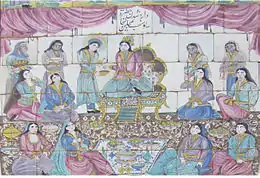Yusuf and Zulaikha
"Yusuf and Zulaikha" (the English transliteration of both names varies greatly) refers to a medieval Islamic version of the story of the prophet Yusuf and Potiphar's wife which has been for centuries in the Muslim world, and is found in many languages such as Arabic, Persian, Bengali, Turkish and Urdu. Its most famous version was written in the Persian language by Jami (1414-1492), in his Haft Awrang ("Seven Thrones"). The story had by then many elaborations, including Sufi interpretation, where Zulaikha's longing for Yusuf represents the soul's quest for God.


Other versions of the story
Another writer who retold the story is Mahmud Gami (Kashmiri). It is a standard tale used in the Punjabi Qisse.
There exists as well a long poem on the subject, titled Yusuf and Zulaikha, which used to be attributed to Ferdowsi, the great Persian poet of the tenth and eleventh century; however, scholars have rejected this book based on its low quality and the timeline of Ferdowsi's life.[1]
Yousuf and Zulaikha in Asia

As in many other Muslim countries, the narrative of the epic love of Yusuf and Zulaikha was covered in classic literary works of East Bengal (modern day Bangladesh): in the 14th century A.D. (during the reign of Sultan Ghiyasuddin Azam Shah), Shah Muhammad Sagir wrote in Bengali a version of Yusuf-Zulekha which is considered one of the greatest literary works of the medieval "golden age" of Bengali literature.
Based on Jami's Persian version, Munshi Sadeq Ali also wrote this story as a poetic-style puthi in the Sylheti Nagari script, which he titled Mahabbatnama.[3]
References
- 'Yusuf and Zalikha: The Biblical Legend of Joseph and Potiphar's Wife in the Persian Version Ascribed to Abul-Mansur Qasim, Called Firdausi, ca. 932-1021 A.D.,' Edited by Hermann Ethé, Philo Press, Amsterdam, 1970
- "Yusuf And Zulaikha". www.metmuseum.org. Retrieved 2018-12-19.
- Saleem, Mustafa (30 Nov 2018). "মহব্বত নামা : ফার্সি থেকে বাংলা আখ্যান". Bhorer Kagoj.
External links
| Wikisource has original text related to this article: |
- "English translation of Jami's Joseph and Zuleika (edited by Charles Horne, 1917)" (PDF). (138 KiB)
- Women Writers, Islam, and the Ghost of Zulaikha, by Elif Shafak
- Mansucript text Yusuf und Zalikha in the collection of Museums für Kunst und Gewerbe Hamburg (MKG 1916.35)
- Jāmī in Regional Contexts: The Reception of ʿAbd al-Raḥmān Jāmī’s Works in the Islamicate World, ca. 9th/15th-14th/20th Century Series: Handbook of Oriental Studies. Section 1 The Near and Middle East, Volume: 128 Editors: Thibaut d'Hubert and Alexandre Papas, with five chapters on the Yusuf and Zuleykha story:
Foundational Maḥabbat-nāmas: Jāmī’s Yūsuf u Zulaykhā in Bengal (ca. 16th–19th AD) By: Thibaut d’Hubert Pages: 649–691
Love’s New Pavilions: Śāhā Mohāmmad Chagīr’s Retelling of Yūsuf va Zulaykhā in Early Modern Bengal By: Ayesha A. Irani Pages: 692–751
Śrīvara’s Kathākautuka: Cosmology, Translation, and the Life of a Text in Sultanate Kashmir By: Luther Obrock Pages: 752–776
A Bounty of Gems: Yūsuf u Zulaykhā in Pashto By: C. Ryan Perkins Pages: 777–797
Sweetening the Heavy Georgian Tongue Jāmī in the Georgian-Persianate World By: Rebecca Ruth Gould Pages: 798–828